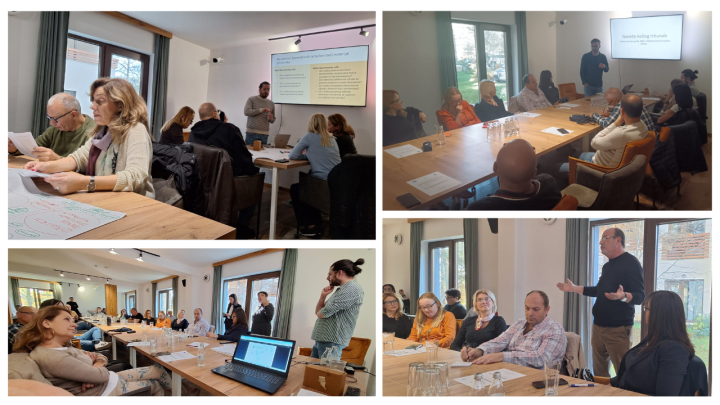MIP participates in workshop for history teachers held in Serbia

On 2 and 3 November 2024, the Mechanism Information Programme for Affected Communities (MIP) took part in a workshop for history teachers focused on incorporating the judicial archives of the International Criminal Tribunal for the former Yugoslavia (ICTY) and the International Residual Mechanism for Criminal Tribunals (Mechanism) into teaching about the 1990s conflicts in the former Yugoslavia. Organised by the Association of History Teachers in Serbia in collaboration with MIP, the European Association of History Teachers (EuroClio), and supported by the United Nations Development Programme Serbia, the workshop was held in Divčibare, Serbia.
The workshop gathered 20 participants, offering them insights into using the ICTY and Mechanism archives to teach complex historical narratives and develop educational resources. Participants were introduced to the second volume of the Guide for History Teachers, created jointly by MIP and history teacher associations from the former Yugoslavia, as a resource for lesson planning. The event included a series of discussions on possible topics in history education, followed by individual presentations by the attendees.
MIP researcher Mr. Nemanja Stjepanović discussed the legacies of the ICTY and the Mechanism, focusing on judicially established facts and supporting evidence material. He provided training on searching the Unified Court Database and exploring the potential use of the documents contained within it for history education. Additionally, he shared insights from MIP’s youth outreach activities, highlighting the educational value of the ICTY and Mechanism archival materials in fostering a deeper understanding of the conflicts that shaped the former Yugoslavia in the 1990s.
The workshop provided a valuable platform for participants to exchange ideas and methodologies for integrating these historical resources into their curricula. Discussions underscored the significance of transitional justice in education and addressed the challenges history teachers face when covering the 1990s conflicts.
Training history educators from the former Yugoslavia on the use of the ICTY and Mechanism archives is part of MIP’s broader initiative. Through these workshops, history educators not only refine their skills in researching courts’ archives but also deepen their understanding of the 1990s conflicts, the crimes committed, and their adjudication by the ICTY and Mechanism. With this training, they are well-equipped to create fact-based and engaging lessons on the recent past of the region, utilising documents and judicially established facts from ICTY and Mechanism cases.
The MIP’s objective is to enhance knowledge and understanding among citizens and communities in the former Yugoslavia about the crimes committed during the 1990s conflicts, drawing from ICTY and Mechanism cases.
The MIP is funded by the European Union.